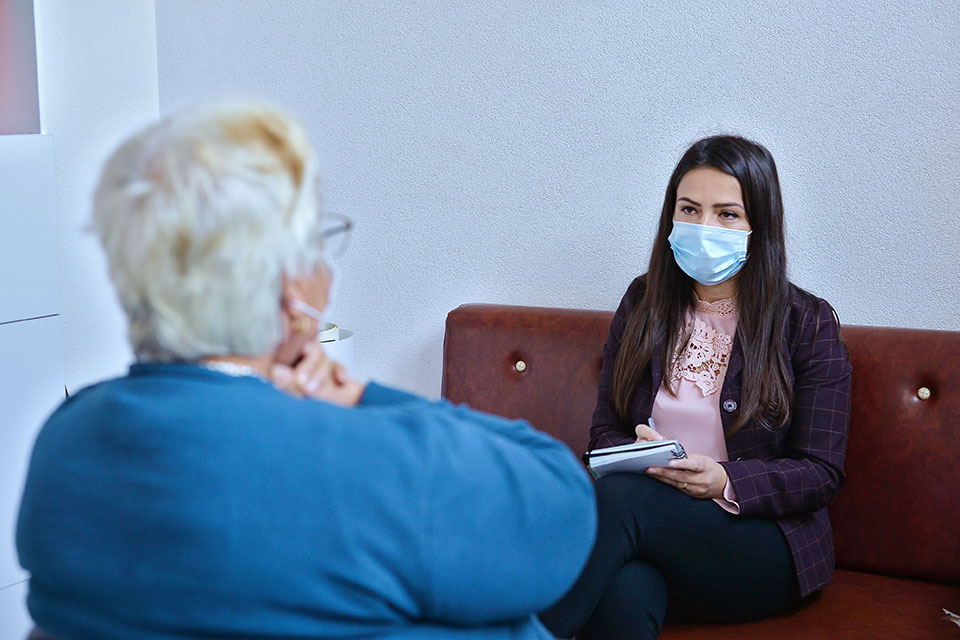What happened after COVID-19: Albania
How six local women’s organizations supported by UN Women and the EU ensured access to justice for survivors of domestic violenceDate:
Even before the COVID-19 pandemic hit, 243 million women and girls globally were abused by their intimate partners in the past year. Since the pandemic, with lockdowns measures, countries around the world have seen an alarming rise in reporting on violence against women, especially domestic violence. UN Women is working with women on the front lines who are responding to the shadow pandemic of violence against women and girls every day. “What Happened after COVID-19 hit”, brings you some of their stories, and how our programmes are backing solutions that leave no one behind.


The situation during the lockdown was the worst. He drank all day at home, became more aggressive and violent. There were days when we had nothing to eat. Sometimes, he gave alcohol to our three sons – the youngest 6 years old and the oldest 11 years old. Once he threw us out of the house and sold our livestock so he could keep drinking.
There were days when I hoped that our lives would end, once and for all.
A few months ago, one of my sons filmed the episodes of violence. I was able to use that as evidence and report my husband to the police. They issued a protection order and immediately put me in contact with the Human Rights in Democracy Center.
The Center assisted me with court proceedings to get a protection order for my children and to receive d psychological support and economic assistance. The organization has been with me in every step during these past few months. They have helped me more than any other person in the world, more than my own mother, more than God.”
UN Women responds through programmes on the ground
Jana Kote* and her three children lived with an abusive husband and father for 12 years until they received support from a local organization, Human Rights in Democracy Centre, based in Tirana, the capital of Albania.
During the COVID-19 pandemic, with support from UN Women and others, the Centre maintained contact with survivors of domestic violence and coordinated with local government institutions and authorities, such as the police, the court system and health institutions to prevent the disruption of these essential services that survivors of violence rely on.
Their coordination and support was crucial for women’s safety. For instance, while the courts in Albania stayed open during the lockdown, they issued protection orders in only 36 per cent of the cases when survivors couldn’t appear in court. Organizations like the Human Rights in Democracy Centre accompanied survivors throughout the legal process, ensuring that they could access justice and the services that they needed.
“We were receiving calls from the police at every hour during the lockdown asking to assist survivors of domestic violence. We provided free legal support and representation in court for 128 cases from May to October,” says Gentjana Zeneli, a lawyer working with Human Rights in Democracy Centre in two municipalities located in the outskirts of Tirana. The organization is one of six civil society organizations partnering with UN Women-EU regional programme on Ending Violence against Women.
During the lockdown period (March to May), the number of calls to the national counseling hotline tripled compared to the same period a year ago, but the number of domestic violence reports to the police was lower than in 2019. The Centre confirms that the inconsistency was due to the difficulty in accessing justice and support during the lockdown.
“Many victims of violence have no information about their benefits, and they do not ask for protection orders for their children”, shared Gentjana Zeneli. In the past months since COVID-19 hit Albania, the Centre has adapted their services and continued providing training to more than a hundred professionals, including the police, local government officials and health professionals, to better respond to cases of violence against women and girls. Following the training sessions, medical professionals issued special reports that help survivors get protection orders for the first time in the municipalities .
*Name changed to protect the individual